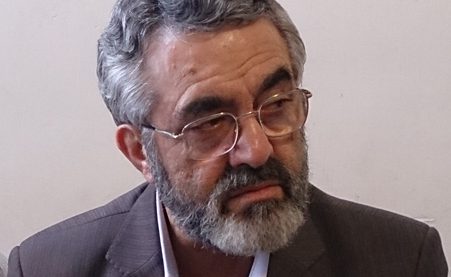Intelligence Ministry Pressures Family Members to Cut Ties with Religious Scholar Who Criticized Supreme Leader

Agents Install Surveillance Camera Outside Dr. Ali Asghar Gharavi’s Home
Relatives and associates of moderate opposition activist Ali Asghar Gharavi, a prominent religious scholar, have come under increasing intimidation tactics by Iran’s Intelligence Ministry, the Center for Human Rights in Iran (CHRI) has learned.
“The last family member to be summoned and questioned was my daughter, Marjan; they interrogated her for four hours,” Gharavi, 75, a senior member of the Freedom Movement of Iran (FMI) and chairman of the party’s branch in the city of Isfahan told CHRI on October 22, 2019.
“All the questions were about her personal beliefs and ties to the FMI,” Gheravi added. “They have summoned other family members, relatives and even associates and asked them to sign all sorts of pledges, namely to cut ties with me.”
He continued: “A few days ago, a lady physician, who’s a specialist, was summoned along with her husband after she submitted a job application at a government organization. The reason was that her father was a follower of my father, Allameh Gharavi. They also made my brother and sister-in-law sign pledges. The security climate is frightening. On many occasions they have even summoned and questioned students who attended my Quran interpretation classes in the past.”
CHRI has documented dozens of cases wherein relatives of activists, journalists and dissidents have been harassed, summoned, and detained as part of a long-established practice by intelligence agencies of silencing criticism of state policies.
While the practice is often focused on foreign-based citizens, Shiite Muslims, Islamic thinkers, researchers, clerics, and intellectuals have also been persecuted, prosecuted, defrocked, and imprisoned for publicly criticizing the views of high-level officials.
Gharavi has been arrested on many occasions, most recently in November 2013 when he was held for two months in solitary confinement for writing an article that was deemed insulting toward the founder of Iran’s Islamic Republic, the late Ayatollah Ruhollah Khomeini.
In September 2014, Gharavi began serving a six-month prison sentence after being convicted of “spreading falsehoods” for writing the article. He was released two months later for medical reasons.
Gharavi told CHRI that the Intelligence Ministry had installed a surveillance camera outside his home.
“On October 3 of last year, Intelligence Ministry agents raided my home, four months after installing a special device on the utility box in front of the house,” he said. “It was obvious they had put a camera in there and it’s still operating, monitoring all comings and goings at my house day and night.”
Gharavi believes he is being targeted because of his political views and father’s sermons against religious superstitions.
“The regime has a problem with me and my late father because of our alternative views on religion and the Quran,” he said. “Before the revolution, most clerics had this problem with my father, which continued after the establishment of the Islamic Republic. In addition, I have been a member of the FMI since before the revolution.”
“These circumstances created a precarious situation, such that in the past 40 years of the Islamic Republic I have been imprisoned seven times,” he said.
The provisional government set up after Iran’s 1979 revolution was headed by Prime Minister Mehdi Bazargan, a moderate religious politician who led the FMI.
He resigned on November 4, 1979, the day radical students took over the U.S. embassy in Tehran.
Read this article in Persian.
